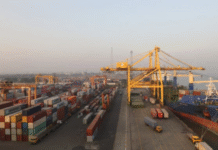The BGMEA has reversed the decision to indefinitely close all readymade garment factories in Ashulia industrial belt, apparently under pressure from the owners.
Hours before on Monday, the apparel industry lobby had announced closure of all units citing security concerns following a spate of labour unrest.
But the decision made many garment owners unhappy and the BGMEA in a media release later in the night said ‘the troubled garment factories in that area will be closed for an indefinite time’.
But after the afternoon announcement, a factory owner, asking not to be named, told bdnews24.com: “Only four of the factories are facing troubles. It’s not clear why BGMEA is closing all the factories instead of finding the problems at those four factories.”
This will make all readymade garment factory owners count losses, he said.
Several others also expressed their frustration over the decision.
The press release, however, did not mention the reasons that led to a change of heart. No BGMEA officials were available for comment either.
On Sunday, authorities had shut down at least 100 garment factories at Ashulia following a clash between police and workers who were demonstrating for better pay.
BGNEA President Atiqul Islam at a press conference in the afternoon said they had taken the decision to shut factories as per the Section 13 (A) of the Labour Act, meaning the workers will not get salary.
Some factory owners present at the media call had expressed their dissatisfaction at the decision to keep all the factories at Ashulia closed.
There are over 300 garment factories enlisted with the BGMEA in the industrial belt that supllies almost 20 percent of the country’s total export-focused apparel produces.
Earlier in the day, the authorities of at least 100 apparel factories at Ashulia on the outskirts of the capital, Dhaka, suspended production in the face of agitation by workers demanding pay hike, benefits and workplace safety.
The workers blockaded the Dhaka-Tangail Highway for about an hour in the morning. They also threw brickbats in some factories and tried to vandalise vehicles on the highway, police said.
The law enforcers charged batons to disperse them, leaving scores of workers injured.
A devastating fire had claimed at least 112 lives at Tazreen Fashions Limited at Ashulia in November last year. At the end of April this year, the disastrous collapse of a nine-storey commercial building Rana Plaza at Savar has so far claimed 1,136 lives.
After the two deadly incidents, Western buyers and the Bangladeshi government have come under renewed pressure to find ways to tighten oversight of the sector, which employs four million people and accounts for 80 percent of exports.
On Sunday, the government set up a panel to raise the minimum wage for millions of garment workers in the wake of international criticisms over the pay and perks and workplace condition in the readymade garment factories.
The factory owners claimed that there were ‘conspiracies’ behind the labour unrest.
Atiqul Islam said: “A vested quarter is out to create turbulence in the readymade garment industry. In the guise of workers, some people are creating chaos over several demands which are against the Labour Act.
The leaders of the BGMEA and Bangladesh Knitwear Manufacturers and Exporters Association (BKMEA) were also present in the meeting held at the BGMEA office in the city’s Kawranbazar.
BKMEA President KM Selim demanded an investigation into the labour unrest and sought help from the government.
”A vested quarter is behind the unrest. Everyone knows who are creating unrest in the country, who had created the Hifazat-e-Islam and who are making provocative remarks.”
The BGMEA President claimed that authorities of 80-90 percent garment factories of Savar were facing problems to run their factories properly following the Rana Plaza collapse.
“In most of the factories, the workers either leave their workplace or abstain from work after punching their ID cards. A similar incident took place in Mirpur today.”
Syed Qamrul Huda, owner of the Arunima Sportsware at Ashulia, said: “A few workers have been creating disturbance in my factory over issues on different occasions. Some fall sick after having tiffin, some only after drinking water. However, the other workers who are eating the same foods aren’t falling sick.”
Owner of ABM Factory in Mirpur area, Washim Rahman, said: “Most of the workers in my factory want to work, but a group of workers numbering 20 to 30 are creating unrest and not allowing others to work.”
Former Advisor to a caretaker government, Tapan Chowdhury, former President of the Federation of Bangladesh Chambers of Commerce and Industry (FBCCI) AK Azad, former BGMEA presidents Abdus Salam Murshedi and Safiul Islam Mohiuddin and former Vice-President of FBCCI Md Jasim Uddin were present at the media call.
There are several allegations over workers’ safety in the garment factories. Many survivors of the Rana Plaza collapse had alleged that the owners of their factories housed on the top floors of the building forced them into work on the fateful Apr 24 morning against their will since they had seen the cracks in the building on the day before.










